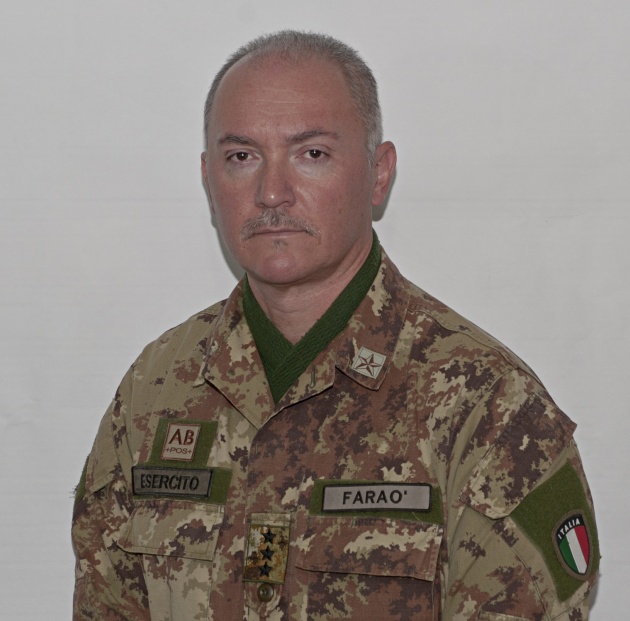
Alessandro Farao’ is a Capitan in the Italian Army and also the manager of Radio Bayan West in Afghanistan. Below is an interview of him about Afghanistan, Central and South Asia Educational system and economy.
FA: Please tell us about yourself and your background?
AF: I am Alessandro Farao’, a Captain in the Italian Army. I have been the manager of Radio Bayan West in Afghanistan since September 2012. This is my 3rd tour of duty here in Herat, twice in the same position. In Italy I am stationed in Pesaro with the 28th Regiment “Pavia” as TV & Radio Company Commander.

FA: Can you tell us about Radio Bayan West and the philosophy behind it?
AF: We could be identified as a radio with a strong educational and informative personality. We have a particular focus on the cultural aspects of Afghanistan. A one year old survey shows that Radio Bayan West is the third favorite radio station in the Herat province. This is due to the quality of its programs, news and music. We produce and broadcast 10 different programs that vary from health to sports, from the universe of women, to business and the economy, from the amazing breadth of Afghan culture to education and new technologies. Our daily efforts are involved with news, reports and interviews with relevant people. In Afghanistan, radio forms a bridge with the entire population, whether the listener is a researcher with an advanced degree, a shopkeeper, a clerk, a farmer or a shepherd in the rural areas.
FA: What do you look for in the projects and partners you work with?
AF: Radio Bayan West has a close relation with some radios in terms of broadcasting our spots or produce some of our programs. In this partnership we support them with professional journalist training and sometimes providing new or more powerful radio equipments. We focus our interest in a new radio projects, better if managed by young entrepreneurs.
FA: What is social media’s role in your business? How much do you use it and how?
AF: We are a branch of a particular unit responsible for creating a positive perception in a variety of different fields.Radio Bayan West is an ISAF media outlet and our task is to provide accurate information on Afghan National Security Forces success, government efforts on socio economic development, reconciliation and reintegration programs, counter-narcotics programs, etc.All these items are managed through the development of posters, handbills, billboards, TV and radio spots. So far our efforts are focused on radio media.
FA: Can film and radio production influence a digital, cultural revolution? If yes, how?
AF: Who use a digital camera can share personal experiences with the rest of the world. It’s not important if it is a movie or a documentary. A new system of communication it’s already a cultural revolution. In our case we produce short movies or TV and radio spots to support our communication campaign. One of our successful products is a radio drama serial. Short stories about different social problems that we produce also in a video format that can be shared with the population using Bluetooth technology.
FA: Where do you see the future of developing countries like Afghanistan? Do you think film making and social media can help improve their economy and education system?
AF: My judgment may be colored by my personal feelings toward this country and my Afghan friends. But I am quite confident that the economic development of the entire region is evolving, as well as for all of Afghanistan. The large amount of good news stories that Radio Bayan West shares daily with its listeners . . . stories about development and the interest of foreign businesses in the area . . . this will create allied activities, and is an opportunity that should not be lost. Film making and social media are involved in this process, both as a witness to what is happening, and as a source of job opportunities.
FA: Can Central and South Asia be the cradle of a new economic growth with its cultural and economic diversity?
AF: It is already so. A new generation means a new economy. It is quite clear that young people are looking for a different future through new technologies. This is an irreversible process. I am not talking about trendy gadgets, but about tools that can be used to connect the entire global population. Innovation and curiosity are going to be key to the success of this new generation. If I were a CEO in a new company I would bet on cultural diversity to realize a successful strategy.
FA: Can you tell us about Radio Bayan West accomplishments in Herat, Afghanistan?
AF: Radio Bayan West is part of the national Radio Bayan network that started broadcasting from Kabul in June 2009. In April 2010 we aired our first program. Now we broadcast for six hours daily, from 0700 to 1000 and from 1600 to 1900 hours. All programs are broadcast in Dari and Pashtun. Our programs are created by Afghans for Afghans. The Italian Army provide the equipment, the Radio Manager (that is also the Artistic Director), the Editorial Chief and technicians. The editorial staff is composed of a crew of four male and one female Afghan journalists. Their names are Haroon, Hamed, Haryan, Mehry and Fereshte. There are also some external correspondents. All of them are graduates from the Journalism faculty at Herat University. Most of them have previous experience with the University Radio Station, “Youth Radio.” The real success of Radio Bayan West is the enthusiasm and talent of this crew.
FA: What do you think about women’s participation in social and digital media activities in Afghanistan?
AF: Our research gives us an overview about the situation of women. I strongly believe women are really close to get past the obstacles of illiteracy and a lack of education, after that nothing will stop their participation. We can confirm more than one instance of female entrepreneurship. One example is Radio Sherazade in Herat that is staffed entirely by women. There is a common feeling of social liberation through work, and a natural creativity that will open a huge number of opportunities and professional satisfaction to Afghan women.



